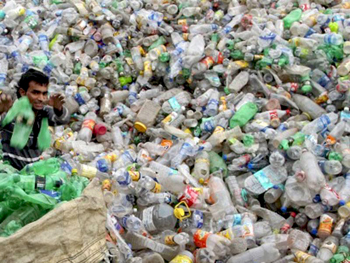Los Angeles, Jul 22: Humans have created 8.3 billion metric tonnes of plastics since early 1950s, and most of it now resides in landfills or the natural environment, a study has found.
Researchers, including those from the University of Georgia (UGA) in the US, found that by 2015, humans had generated 8.3 billion metric tonnes of plastics, 6.3 billion tonnes of which had already become waste.
Of that total waste, only 9 per cent was recycled, 12 per cent was incinerated and 79 per cent accumulated in landfills or the natural environment, researchers said.
If current trends continue, roughly 12 billion metric tonnes of plastic waste will be in landfills or the natural environment by 2050, they said.
"Most plastics do not biodegrade in any meaningful sense, so the plastic waste humans have generated could be with us for hundreds or even thousands of years," said Jenna Jambeck, associate professor of engineering at UGA.
"Our estimates underscore the need to think critically about the materials we use and our waste management practices," said Jambeck.
The scientists compiled production statistics for resins, fibres and additives from a variety of industry sources and synthesised them according to type and consuming sector.
Global production of plastics increased from 2 million metric tonnes in 1950 to over 400 million metric tonnes in 2015, according to the study published in the journal Science Advances, outgrowing most other human-made materials.
Notable exceptions are materials that are used extensively in the construction sector, such as steel and cement.
However, while steel and cement are used primarily for construction, plastics' largest market is packaging, and most of those products are used once and discarded.
"Roughly half of all the steel we make goes into construction, so it will have decades of use - plastic is the opposite," said Roland Geyer, associate professor at University of California, Santa Barbara (UCSB).
"Half of all plastics become waste after four or fewer years of use," said Geyer.
The pace of plastic production shows no signs of slowing. Of the total amount of plastics produced from 1950 to 2015, roughly half was produced in just the last 13 years.
"What we are trying to do is to create the foundation for sustainable materials management," Geyer said.
"Put simply, you can not manage what you do not measure, and so we think policy discussions will be more informed and fact based now that we have these numbers," said Geyer.
The same team of researchers led a 2015 study published in the journal Science that calculated the magnitude of plastic waste going into the ocean. They estimated that 8 million metric tonnes of plastic entered the oceans in 2010.
"There are people alive today who remember a world without plastics," Jambeck said.
"But they have become so ubiquitous that you can't go anywhere without finding plastic waste in our environment, including our oceans," said Jambeck.
The researchers cautioned that they do not seek the total removal of plastic from the marketplace, but rather a more critical examination of plastic use and its end-of-life value.





Comments
Add new comment